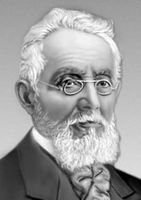Mendele Mocher Sforim
|
|
Mendele Mocher Sforim (מענדעלע מוכר ספֿרים) (December 21, 1835 (O.S.) = January 2, 1836 (N.S.) - November 25 (O.S.) = December 8 (N.S.), 1917), "Mendele the bookseller," is the pseudonym of Sholem Yakov Abramovich, Jewish author and one of the founders of modern Yiddish and modern Hebrew literature. He was born to a poor family in Kopyl near Minsk and lost his father, Chaim Moyshe Broyde, shortly after he was bar mitzvahed. He studied in yeshiva in Slucak and Vilna until he was 17; during this time he was a day-boarder under the system of Teg-Essen, barely scraping by, and often hungry. He next travelled extensively around Belarus, Ukraine and Lithuania at the mercy of an abusive beggar named Avreml Khromoy (Avreml would later become the source for the title character of Fishke der Krumer, Fishke the Lame). In 1854 he settled in Kamenets-Podolskiy, where he got to know writer and poet Avrom Ber Gotlober, who helped him to learn secular culture, philosophy, literature, history, Russian and other languages. His first article, "Letter on Education", appeared in first Hebrew newspaper, Hamagid, in 1857. At Berdichev in the Ukraine, where he lived in 1858-1869, he began to publish fiction both in Hebrew and Yiddish. Having offended the local powers with his satire, he left Berdichev to train as a rabbi at the relatively theologically liberal, government-sponsored rabbinical school in Zhitomir, where he lived in 1869-1881, and became head of traditional school (Talmud Torah) in Odessa in 1881. He lived in Odessa until his death in 1917.
He initially wrote in Hebrew, coining many words in that language, but ultimately switched to Yiddish in order to expand his audience. Like Sholom Aleichem, he used a pseudonym because of the perception at the time that as a ghetto vernacular, Yiddish was not suited to serious literary work — an idea he did much to dispel. His writing strongly bore the mark of the Haskalah. He is considered by many to be the "grandfather of Yiddish literature"; his style in both Hebrew and Yiddish has strongly influenced several generations of later writers.
While the tradition of journalism in Yiddish had a bit more of a history than in Hebrew, Kol Mevasser, which he supported from the outset and where he published his first Yiddish story "Dos Kleine Menshele" ("The Little Man") in 1863, is generally seen as the first stable and important Yiddish newspaper.
Sol Liptzin writes that in his early Yiddish narratives, Mendele "wanted to be useful to his people rather than gain literary laurels". [Liptzin, 1972, 42] "The Little Man" and the unstaged 1869 drama Die Takse ("The Tax") both condemned the corruption by which religious taxes (in the latter case, specifically the tax on kosher meat) were diverted to benefit community leaders rather than the poor. This satiric tendency continued in Die Klatshe (The Dobbin, 1873) about a prince, a stand-in for the Jewish people, who is bewitched and becomes a much put-upon beast of burden, but maintains his moral superiority throughout his sufferings.
His later work became more humane and less satiric, starting with Fishke (written 1868-1888) and continuing with the unfinished Masoes Beniamin Hashlishi (The Wanderings of Benjamin III, 1878), something of a Jewish Don Quixote.
As with Fishke, Mendele worked on and off for decades on his long novel Dos Vinshfingeril (The Wishing Ring, 1889); at least two versions preceded the final one. It is the story of a maskil—that is, a supporter of the Haskalah, like Mendele himself—who escapes a poor town, survives miserable to obtain a secular education much like Mendele's own, but is driven by the pogroms of the 1880s from his dreams of universal brotherhood to one of Jewish nationalism.
His last major work was his autobiography, Shlome Reb Chaims, completed shortly before his death.
References
- Liptzin, Sol, A History of Yiddish Literature, Jonathan David Publishers, Middle Village, NY, 1972, ISBN 0-8246-0124-6, especially 40-45.de:Mendele Moicher Sforim

